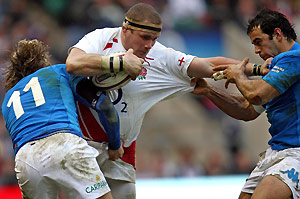
A few minutes into the Scotland-Wales Six Nations match, the Scots halfback threw a shocker of a pass to his five-eights: “He’s thrown a ‘Bergamasco,'” the TV commentator yelled out. And so Marco Bergamasco, one of rugby’s great loose forwards, has now been immortalised for all the wrong reasons.
He was forced to play at halfback against England by an overly ambitious and enteprising Nick Mallett, despite the fact that he’d never played the position before.
His laboured passes, delivered after several paces sideways with the ball (in the George Gregan manner) and which went either behind his five-eighths or over his head or along the ground, lead to England’s first three tries.
By the time Bergamasco was replaced at half-time, the game was lost by Italy. Mallett should really have made the change after ten minutes when even that early in the match the experiment was blowing up in Italy’s face.
The 36 – 11 scoreline to England flattered the home side.
The crowd at Twickenham, usually so John Bullish in their support for the home side, were doing Mexican waves and drifting out of the stadium well before the end of the match.
If England play as poorly as they did against Italy next weekend against Wales at the Millennium Stadium they will be, and should be, annihilated.
And the annihilation, if it comes to pass, will be a deserved punishment for the English rugby establishment, the RFU particularly, and some of the senior rugby journalists (especially the Usual Suspect at the Sunday Times) for their brain-dead crusade for over 100 years to take the rugby out of the Rugby Football game.
Now people like the Usual Suspect are complaining about England’s inability to play attractive, winning rugby.
What you sow, as the Bible says, so also do you reap.
The RFU (the England rugby union) has opposed every attempt to make rugby an expansive, attractive and skillful game since the 1890s. The RFU’s latest crusade to kill off the rugby in Rugby Football has been its ideologically-driven determination to stop the ELVs train dead in its tracks.
Is it any wonder, given this mentality, that despite England having more than three times the number of players than any of the major rugby nations, its national side is noted for its plodding, negative and generally unsuccessful rugby.
If 2009 is another shameful chapter in the book of England’s failures, then one can only rejoice in the misery that the RFU and the Usual Suspect suffer from the woeful play of their team.
The Welsh Rugby Union has officially opposed the ELVs and the coach of the Dragons, the New Zealander Warren Gatland, has expressed some misgivings about the reforms. But Wales destroyed Scotland by playing brilliant ELVs rugby.
This brilliant approach was most noticeable in the running play of the outstanding fullback in world rugby, Lee Byrnes, in the play of Shane Williams, coming into the backline from all sort of positions, and the shoulder-charging power of Andy Powell, whose hit-ups from phase play and bringing the ball back from kicks had all the directness and effectiveness of a tank rolling over a trench and barbed-wire defensive line.
Just as brilliant in its play was Ireland at Coker Park in its 30 – 21 defeat of France.
Both sides played expansive rugby. The ball was moved from one side of the field constantly. Breaks were made with clever ensemble play, and occasionally by individual breaks; the best being a dazzling piece of running from Brian O’Driscoll, who showed for a few sensational moments why he was regarded a few years ago as one of rugby’s greatest centres.
When the ELVs were introduced into the Northern Hemisphere without, unfortunately, the tap penalty sanction for most infringements at the ruck and maul (a pyrrhic victory for the RFU) there was a constant chatter about how ‘unstructured’ the game had been allowed to become.
I could never work out what ‘unstructured’ really meant, for under the full ELVs, there was scope for more scrums, rather than few scrums.
It seems that, for the critics of the ELVs, ‘unstructured’ was a euphuism of ball-in-hand running rugby.
It was noticeable watching the opening matches of the 2009 Six Nations tournament that the two outstanding sides, Wales and Ireland, did not kick very much at all once they started running with the ball and getting their phases going.
Moreover, the Ireland-France and Wales-Scotland matches were extremely vibrant, well-played, exciting and intense rugby matches. The England-Italy match, which was played by England as if the ELVs were not in play, was dull and insipid fare.
Next weekend in the Six Nations tournament we have France-Wales, Scotland-Italy (with the Azzurri playing a specialist halfback) and Ireland-England.
If every thing works out the way it looks like it will after the first round, the Six Nations will be decided on its last weekend on March 21 when Wales and Ireland play the final game of the tournament at the Millennium Stadium.





























































































